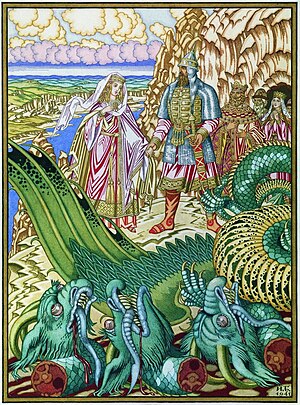ബൈലിന

ഒരു പഴയ റഷ്യൻ വാമൊഴി ഇതിഹാസ കാവ്യമാണ് ബൈലിന (റഷ്യൻ: были́на, IPA: [bɨˈlʲinə]; pl. были́ны byliny) .[1] ബൈലിനി ആഖ്യാനങ്ങൾ ചരിത്രപരമായ വസ്തുതകളെ അടിസ്ഥാനമാക്കിയുള്ളതാണ്. എന്നാൽ ഫാന്റസിയോ അതിഭാവുകത്വമോ കൊണ്ട് ഇവ വളരെയധികം അലങ്കരിക്കപ്പെട്ടിരിക്കുന്നു.[2] "ആയിരിക്കുക" (റഷ്യൻ: был, tr. byl) എന്ന ക്രിയയുടെ ഭൂതകാലത്തിൽ നിന്നാണ് ബൈലിന എന്ന പദം ഉരുത്തിരിഞ്ഞത്, അത് "എന്തോ ആയിരുന്നോ" എന്നാണ് സൂചിപ്പിക്കുന്നത്.[3] ഈ പദം മിക്കവാറും റഷ്യൻ നാടോടിക്കഥകളിലെ പണ്ഡിതന്മാരിൽ നിന്നാണ് ഉത്ഭവിച്ചത്. 1839-ൽ, റഷ്യൻ ഫോക്ക്ലോറിസ്റ്റായ ഇവാൻ സഖറോവ് റഷ്യൻ നാടോടിക്കഥകളുടെ ഒരു സമാഹാരം പ്രസിദ്ധീകരിച്ചു. അതിന്റെ ഒരു ഭാഗത്തിന് "ബൈലിനി ഓഫ് ദി റഷ്യൻ പീപ്പിൾ" എന്ന തലക്കെട്ട് നൽകി. ഇത് ഈ പദത്തിന്റെ പ്രചാരത്തിന് കാരണമായി.[4][5] ഇഗോർ കഥയുടെ തുടക്കത്തിലെ ബൈലിന എന്ന വാക്ക് "ഒരു പുരാതന കവിത" ആയി സഖാരോവ് തെറ്റിദ്ധരിച്ചതായി പിൽക്കാല പണ്ഡിതന്മാർ വിശ്വസിക്കുന്നു. ബൈലിനിയിലെ നാടോടി ഗായകർ അവരുടെ പാട്ടുകൾ സ്റ്റാറിനി (റഷ്യൻ: ста́рины, IPA: [ˈstarʲɪnɨ], starines; sg. ста́рина സ്റ്റാറിന) അല്ലെങ്കിൽ സ്റ്റാറിങ്കി (റഷ്യൻ: ста́ринки: "പഴയ കഥകൾ" (Rus. stary) എന്നർത്ഥം) എന്ന് വിളിക്കുന്നു. [2]
ചരിത്രം
[തിരുത്തുക]മിക്ക പണ്ഡിതന്മാരും വെസെവോലോഡ് മില്ലർ പ്രകടിപ്പിച്ച പതിപ്പ് പാലിക്കുന്നു, ഒരു പഴയ വിഭാഗമെന്ന നിലയിൽ ബൈലിനി റഷ്യൻ നോർത്തിൽ നിന്നാണ് ഉത്ഭവിച്ചത്. മില്ലറുടെ അഭിപ്രായത്തിൽ, പഴയ റഷ്യൻ ബൈലിനിയുടെ പ്രോട്ടോടൈപ്പ് വിശുദ്ധ വടക്കൻ ഇതിഹാസങ്ങളായിരുന്നു, ഒരു പ്രത്യേക "ബൈലിനിക് ടെക്നിക്" അനുസരിച്ച് വായിച്ചു, "തലമുറകളിൽ നിന്ന് തലമുറകളിലേക്ക്, അധ്യാപകൻ വിദ്യാർത്ഥിയിലേക്ക്" കൈമാറി.[6]ഉത്ഭവ സമയം സംബന്ധിച്ച് ബൈലിനിയിൽ, ലിയോണിഡ് മെയ്കോവ് ഏറ്റവും വ്യക്തമായി പ്രകടിപ്പിച്ചു, അദ്ദേഹം എഴുതി:
All the content of byliny, including the most old traditions, is presented in such an edition, which can be dated only to the ancient historical period. The content of byliny was developed at a very early period, perhaps even before the formation of the Old Russian state.
Finally, according to Orestes Miller, the great antiquity of byliny is proved by the fact that they depict a defensive policy, not an offensive one.[6]
അവലംബം
[തിരുത്തുക]- ↑ Bylina (Russian Poetry). Retrieved 5 December 2010.
{{cite book}}:|work=ignored (help) - ↑ 2.0 2.1 Oinas, Felix J. (1978). "Russian Byliny". Heroic Epic and Saga: an Introduction to the World's Great Folk Epics. Bloomington: Indiana University Press. p. 236.
- ↑ Bailey, James; Ivanova, Tatyana (1998). An Anthology of Russian Folk Epics. Armonk, NY: M. E. Sharpe. p. xx.
- ↑ Alexander, Alex E. (1973). Bylina and Fairy Tale; the Origins of Russian Heroic Poetry. The Hague: Mouton. p. 13.
- ↑ Alexander, Alex E. (September 1975). "Bylina and Fairy Tale: The Origins of Russian Heroic Poetry". Slavic Review. 34 (3). Jack V. Haney (reviewer). Association for Slavic, East European, and Eurasian Studies: 648–649. doi:10.2307/2495628. JSTOR 2495628.
- ↑ 6.0 6.1 Orest Miller. "Historical School of Folklore Studies" (in Russian).
- ↑ About the bylins of the Vladimir cycle. - St. Petersburg: printing house of the Department of Foreign Trade, 1863. - p. 139.
